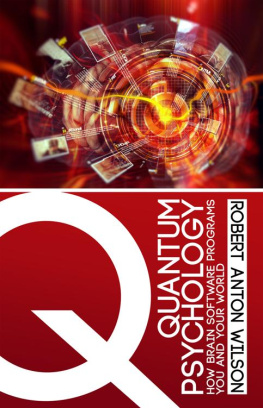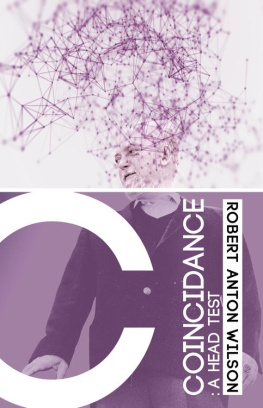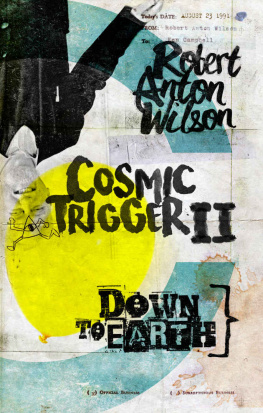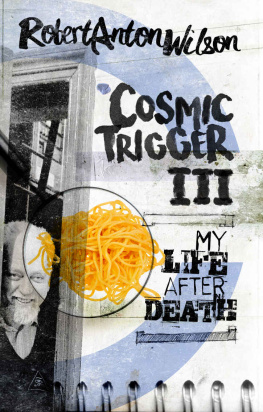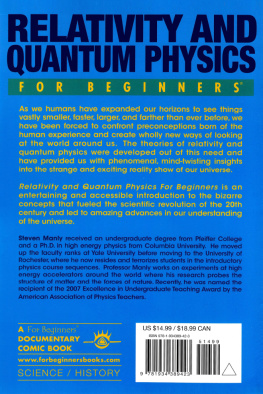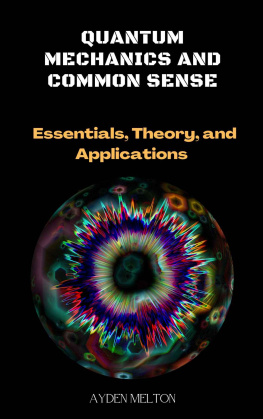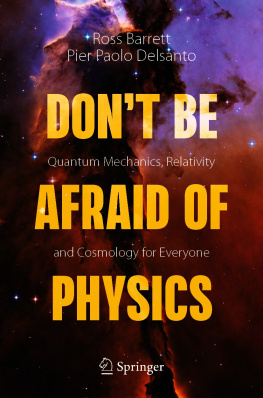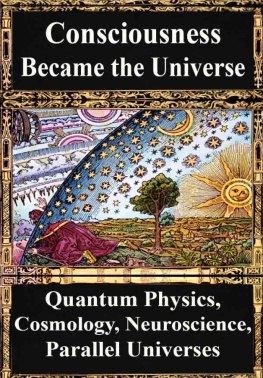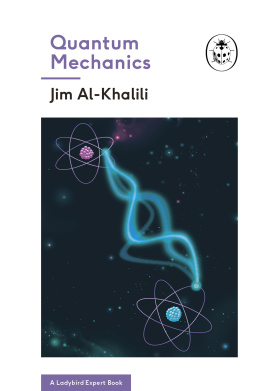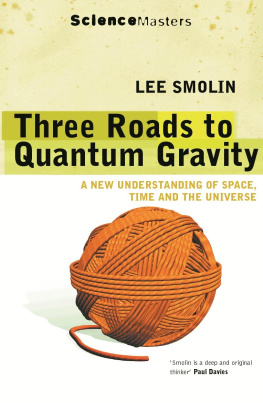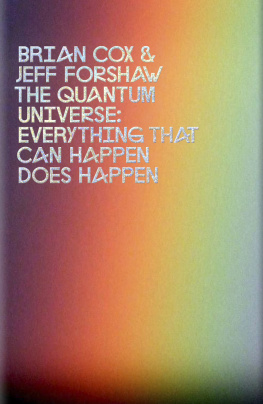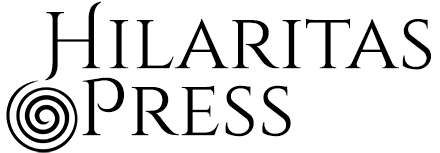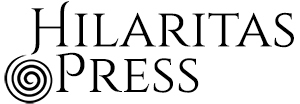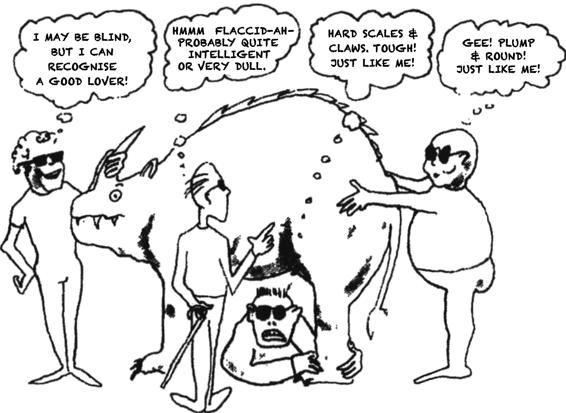Quantum Psychology
How Brain Software
Programs You and Your World
Robert Anton Wilson
Introduction by
David Jay Brown
TABLE OF CONTENTS
Quantum Psychology
How Brain Software
Programs You and Your World
Robert Anton Wilson
Hilaritas Press, LLC.
P.O. Box 1153
Grand Junction, Colorado 81502
www.hilaritaspress.com
Copyright 1990 Robert Anton Wilson
All rights reserved. No part of this book, in part or in whole, may be reproduced, transmitted, or utilized, in any form or by any means, electronic or mechanical, including photocopying, recording, or by any information storage and retrieval system, without permission in writing from the publisher, except for brief quotations in critical articles, books and reviews.
First Print Edition: 1990
eBook Version 1.0 2016
Cover Design by amoeba
eBook Editing & Design by Pelorian Digital
Proofreading & Index Creation by Charles Faris
Hilaritas Press, LLC.
P.O. Box 1153
Grand Junction, Colorado 81502
www.hilaritaspress.com
To
Laura and John Caswell
Rise and look around you...
Introduction
By David Jay Brown
Robert Anton Wilson had a remarkable talent for leading readers to question assumptions that they didnt even know that they had, and redefine their unconsciously-constructed notions of reality. He had an uncanny ability to lead his readers, unsuspectingly, into a mutable state of mind where they are playfully tricked into aha experiences that cause them to question their most basic assumptions about what is real and what isnt.
Wilsons books are the literary equivalent of a psychedelic experience, and they can be every bit as mind-expanding and life-transforming as a healthy swig of some potent Amazonian jungle juice. In other words, his books will effectively remove any sense of certainty that you might have about anything and everything, and force you to reevaluate the world with sparkling new perspectives.
Many people, beside myself, attribute their initial psychological awakening to their reading of Wilsons psychoactive books. It was his autobiographical book Cosmic Trigger that not only allowed me to understand the concept of multiple realities, but also inspired me to become a writer and mind explorer when I was a teenager. Wilson wrote the introduction to my first book, Brainchild, so it feels like a karmic sense of circular return to have the honor of writing an introduction to one of his books.
Considered one of Wilsons most influential books, Quantum Psychology is responsible for numerous peoples awakenings into higher states of awareness. I think that this is one of the most brilliant books ever written, but before entering its golden gates, I must first warn you after reading this book you will never be quite the same again.
Your Nervous Systems Defines Your Reality Wilson sets the stage by making it clear that all fields of science should be properly prefaced with the term neuro; i.e. neuro-physics, neuro-chemistry, neuro-astronomy, etc. because the human nervous system filters every sensory perception with a conceptual grid, and creates such a bias in the reception of every sensory signal, or measurement, that we can never know what the universe is like without it. Generally agreeing with the Copenhagen interpretation of quantum physics, Wilson maintains that it is impossible for us to ever directly experience deep reality, and that all we ever seem capable of knowing from our senses or our technologies is existential reality, or what we can experience of the world through our bodies or instruments.
We can never even have a pure form of neuroscience the study of the nervous system. Rather, we can only have neuro-neuroscience the study of the nervous system as perceived by the nervous system! Wilson points out that the study of brain science will prepare one for quantum theory better than the study of classical physics would. In this way, Wilson unites quantum mechanics with neuroscience, Transactional Psychology, and the Eastern philosophies.
Wilson makes the point, multiple times in multiple ways, that perception isnt a passive process, but rather, is an active interpretation of signals. In other words, sensory perception what we see, hear, taste, touch, and feel is an inherently creative event, and every person is an artist in their everyday, ordinary view of the world. Wilson asks us to look at how this understanding of perception is similar to the law that quantum physicists describe when they state, the observer cannot be left out of the description of the observation.
Likewise, we know that whatever type of tool that we use for measuring any event determines the way in which that event is perceived, sometimes with seemingly contradictory results. For example, in quantum physics this measurement problem creates the classic philosophical dilemma of whether light is composed of particles or waves.
Accepting both types of measurements as expressing different types of truth as with the popular story of the 7 blind Sufis and the elephant seems to solve this strange mystery. The ever-persistent, classic dualistic problem of how the mind connects with (or differentiates from) the body dissolves like the Wicked Witch, splashed with a bucket of Oz water, if we think in terms of the organism-as-a-whole like physicists think of space and time as a space-time continuum, rather than as physically separate domains.
Above: RAWs interpretation of the story of the Blind Sufis and the Elephant. - graphic from Prometheus Rising .
The Quantum Reality of Mind-Body Systems As Wilson makes abundantly clear, the careful study of both matter and mind ultimately lead us to question our normal notions of what we generally regard as reality. Wilson examines the commonly accepted notion that we live in a Newtonian universe i.e., a world governed by the cause-and-effect mechanics of classical physics and shows how the celebrated problems and weird paradoxes, as well as the general philosophical enigmas of the quantum world, have correlates that frequently appear in our daily lives.
Wilson shows us that understanding the logic of quantum physics isnt nearly as difficult as many physicists would have us believe, and that understanding the non-dualistic nature of reality can help us to become smarter and happier people. He draws insightful parallels between the uncertainty encountered in quantum physics and the uncertainty that we commonly encounter every day in the world around us.
Wilson reminds us that those people who respond best to placebos in other words, using the power of the mind through belief, to directly affect the body also register high on their awareness of what the late psychologist Carl Jung referred to as synchronicity the perception of personally meaningful coincidences. This interesting connection makes sense, and the so-called mind-body problem that has been debated by psychologists and philosophers for centuries appears to be suddenly solved, by replacing Aristotelian (either/or) logic with a quantum logic model of information translation, i.e., replacing the dualistic words mind and body with the more accurate term psychosomatic unity.

